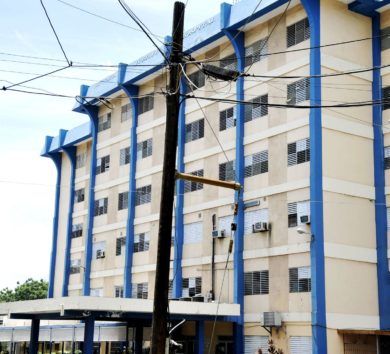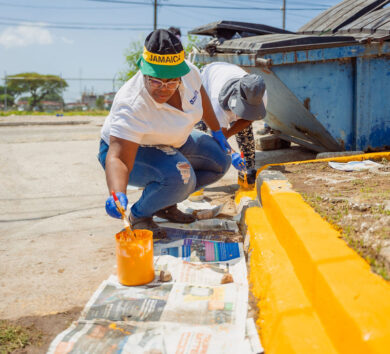

The following is a contribution to the 2022-2023 Sectoral Debate, made in the House of Representatives on April 12 by Phillip Paulwell, opposition spokesman on mining and energy.
Recently while in London, I attended the play ‘Get Up Stand Up’, which depicts the life and music of the legend, Robert Nesta Marley.
I was supremely proud of that experience, even becoming emotional especially as I witnessed the audience, rocking and vibrating to the Jamaican music and obviously understanding our rhythmic language.
The greatness of Bob and Jamaica was fully on show. We are indeed a cultural superpower.
Anywhere in the world you go, Jamaica as a country is known and it is due to our greatness in music and sports.
It causes the questions:
• Why then can’t we achieve greatness in other aspects of our lives?
• Why can’t we overcome our spotty achievements in education with the limited areas of excellence and cause that to be replicated across the entire system?
• Why do we continue to waste so many of our people by meaningless bloodletting when so many of our visitors believe that Jamaicans are so friendly and peaceful?
That last is the most tragic irony that we face.
This level of violence is senseless, and we must solve it.
Jamaica has one of the highest repeat visitor ratios in the Caribbean; yet so many of our people now perceive their future as revolving around securing immigrant status in a foreign destination.
I really believe that we have to use the occasion of our 60th anniversary to take stock and to truly define and work toward a safer and more secure Jamaica – a Quality Society if you will. Yes, we need to define and work towards the Jamaican Dream.
I am disappointed that so far, we have not seen it fit to use this Diamond Jubilee as an opportunity to advance some major transformational projects, some Big Ideas that will lead to major development projects to benefit our people.
That on the turn of the century, the then government promulgated many Millennium Projects.
These included:
• The massive highway across the East-West and the North-South corridors.
• The massive airport development that transformed the Montego Bay airport into a
Caribbean hub.
• The Modernization of the Port of Kingston leveraging its ideal location the Caribbean’s preeminent logistics hub.
• The redevelopment and Modernisation of the island’s main Cruise Ship Ports and the establishment of the Port Antonio Marina.
• Major hotel projects that brought new investors into our Tourism Product and which opened Destination Jamaica to new markets beyond the US, UK and Canada.
• Revolutionary telecommunications development and expansion that brought modern communication tools and technology within the reach and access of even the most remote Jamaican villages and townships.
• Expansion of the spaces available on island to Jamaicans seeking high quality tertiary education and professional training opportunities.
And several others which I will go into on other occasions in different spaces throughout this Diamond Jubilee Year.
Yes, it is true that we are experiencing the twin crises of the pandemic and now the Russian war with Ukraine and it is felt that we have to batten down and keep our nerves and be fiscally conservative.
Yet as famed Stanford Economist Paul Romer once declared; “a crisis is a terrible thing to waste”. A sentiment echoed by former US Secretary of State Hillary Clinton and White House Chief of Staff Rahm Emmanuel as well as our very own Michael Lee Chin.
Like Lee Chin, I believe deeply in that concept.
Now is the time to be bold and pursue transformational projects that will enable us to catch up to the objectives of our Vision 2030 master plan for Jamaica.
To see exponential, sustained and inclusive growth in our economy and development in our society with greater wealth created to enable our per capita income to approach first-world status is the overriding objective of Vision 2030. It was the last PNP Administration that took the bold decision to place our economy on a path of fiscal responsibility and prudent debt management. We asked the Jamaican people to make sacrifices and the economy made gains. The Opposition has no desire to destroy those gains, but we owe it to our people to take advantage of those gains and create a better life for all Jamaicans
and not only a few.
It is still possible for many Big Ideas to emanate during this year by both sides of the aisle working together on behalf of the citizens of this country.
Let me therefore lend my own brand support and endorsement of the theme under which we mark this Diamond Jubilee.
I submit that if the citizens are to believe in this theme and support it wholeheartedly, ideas and plans need to be developed that place the people at the centre.
So that each Jamaican will feel that they are considered as participants in the success and
no longer (as many feel) mere spectators. The development and implementation of such bold ideas and plans need not be characterised with the usual unending disputes and conflicts.
We can preempt this historic impediment by a deliberate strategy that must be led by the Government to have meaningful and effective consultation to involve, from the outset, the views and cooperation of the Opposition.
And then to rid ourselves of the usual suspicion of graft, by ensuring that all aspects of such projects are constantly monitored, and scrutinised by the Public Administration and Appropriations Committee that is chaired by the Opposition.
That would only require an amendment to our Standing Orders. We on this side of the House would favour it and I am asking the Government side to join us as this will work for both us and them regardless of the swing of the pendulum of power in this House.
Let that be a bold Big Idea as well.
I would like to use this opportunity, during this limited time, to share some examples of such bold ideas.
I turn now to the portfolios Energy and Mining.
ENERGY
Burden Of High Prices
We are facing yet again, another energy crisis. This is probably worse than those of the seventies and the period 2008-2010.
I’m sure that everywhere you turn, you are hearing, as we all are, the howls of cries from everyone of higher electricity bills (light bills) and even more dramatic and weekly record-breaking price increases for petrol and cooking gas or kerosene.

The JPSCo is complaining that it has become a tax collections agency of the Government. The same claim can be made of Petrojam and gas retail dealers.
In the face of this great crisis the Government continues to engorge itself on the billions and billions of taxes collected.
I repeat the calls by the Leader of the Opposition and our Spokesman on Finance as well as calls that have come in from many leaders of industry to cap the tax component on the fuel by using the Government’s own benchmark price established in this year’s budget at US$67.
I also see the JPSCo’s CEO proposing a tax cut on electricity bills. Let me reiterate – taxes alone account for 16 per cent of our light bills.
I support this call as well.
The Government has announced a 20 per cent discount for JPSCo’s customers for four months.
The Honourable Minister of Finance must be aware that prices have already increased by more than 40 per cent since the start of the year. Therefore, a four-month respite though appreciated is woefully inadequate Minister.
Consider these suggestions, Minister Clarke: Extend the concession for the entire year as you consider the calls we have made, and now, the JPSCo are making in relation to the relaxation of the tax regime specific to fuels.
Extend the existing waiver of $4.56 per liter on automotive diesel oil which was granted to electricity generators and which will expire on April 30 into the foreseeable future.
Let us focus on the wider energy dynamic in which we seek to electrify our growth and development targets.
ENERGY SECURITY AND VENEZUELA
An observation that the JPSCo’s CEO has also made, and of which I had every intention of addressing here is the issue of our energy security. It is very likely that there will be a mad scramble by countries to find new sources for fuels as further sanctions against Russia escalates.
I think that the only realistic, near-shore and reliable source of crude oil and finished products is Venezuela.
But Venezuela is currently under US sanctions which quite understandably the GOJ is not going to violate. However, there is another approach. One which will require employing good diplomatic skills.
Recall, in 2013 the US government had expressed great reservation about the Petrocaribe Agreement.
There was discernible concern in Washington about the growing close relationship between Venezuela and certain CARICOM states. We were asked to attend a summit in Washington to discuss the issues. The summit was chaired by then Vice President Joe Biden. Jamaica was ably represented by then Prime Minister Portia Simpson Miller, I attended in support as the portfolio minister.
To the credit of the United States, all member states were invited and were in attendance. We used the opportunity to speak certain truths to our American friends.
We not only defended our position to continue with the Petrocaribe arrangement, but we also challenged the US administration to assist us with our energy security issues.
Out of that summit in Washington came the following:
A Letter of Intent for energy cooperation signed between the US Energy Secretary and myself Jamaica becoming the first Non-NAFTA country to get access to US LNG supplies. That is how New Fortress Energy emerged in our market and we acknowledge the more than US$1B investment in Jamaica by that company and the diversification in our fuel sources that was achieved.
US support by way of OPIC financing of two major renewable energy projects valuing over US$200M in the 36MW wind farm by BMR in Malvern, St Elizabeth and the 20MW solar farm by WRB in Content, Clarendon.

I daresay that out of that mission to Washington, the roots were firmly planted for the official visit of former President Barack Obama to Jamaica.
That is how diplomacy works. Principled discussions, speaking truths to our friends and pursuing our best interest which involved the participation of our CARICOM sovereign siblings and in the spirit of collective cooperation among friendly nations in the interest of our respective peoples.
Now in relation to Venezuela, I’m not sure how we will overcome what was a most glaring act of ungratefulness shown to Venezuela by Jamaica.
This ungraciousness, notwithstanding the billions of US dollars benefits throughout the course of the
Petrocaribe Agreement but also the US$1.5B write off Jamaica received of our debt to Venezuela. As the sanctions remain a block to any trade with Venezuela, it is now necessary for the GOJ to approach our US partners requesting special dispensation to overcome the sanctions.
This is how diplomacy works.
REVIEW OF ELECTRICITY ACT AND RIGHT OF FIRST REFUSAL
There are some other issues relating to energy that could have negative impact on us both for the short and long-run periods.
You are aware that there has been a Joint Select Committee of the Parliament reviewing the Electricity Act which I piloted in
One issue that has arisen is the right of first refusal that JPSCo has in relation to the addition of new generation capacity to the grid.
This was conceded to them in 2015 because of the urgency to diversify fuel sources.
It has been one of the controversial issues for the committee and one that has elicited strong opposition from members.
But lo and behold, it was confirmed to me that the company is actively pursuing a soliciting process for bids to replace 171.5 MW of existing capacity. I’m also aware that the proposal is to use natural gas (LNG) as the main fuel with ADO as the alternative fuel.
I have some concerns.
The demand for electricity has been falling especially since COVID-19. It is likely to continue to fall as many customers move their business to other sources.
The questions that must be asked are:
• Will there be enough demand to justify the addition of this new capacity to the grid
(albeit replacing existing capacity)?
• Will the already overburdened JPS customers have to pay the fixed capacity charges; even if
this plant is not called upon to produce any electricity?
• Will the JPS customers have to meet the commitment for fuel charges as another “take or pay” arrangement is institutionalised?
• Why would the alternative fuel be ADO when HFO has proven to be a cheaper source?
• Why would the company be rushing this process when the Joint Select Committee is addressing this very issue in the review?
I also want to use this opportunity to lend support to a clear recommendation coming from the joint select committee to enable operators in the Special Economic Zones to generate and distribute lower priced electricity within those zones.
This will encourage more export-oriented companies to be established. The GOJ has earmarked special funding in this year’s budget for the small and medium sized enterprises. One of the most significant factors affecting the growth and development of this important sector is the high cost of energy.
This is so whether the business is involved in the production of goods or services.
I invite the Minister and the Cabinet to consider this – create a specific sum of funds from the pool to be allocated and dedicated to the small and medium sector to enable them to establish modern solar or wind generating facilities along with a vibrant mechanism to allow them to make important energy efficiency and conservation changes in their operations.
There has to be incentives and penalties provided to encourage the retail lending institutions to aggressively target and pursue these operators. The lenders have to be more responsive to the needs of the sector. Past performance has not been very positive.
A NEW JPSCO LICENCE
The point has been raised that the JPSCo licence will come to an end in 2027. The GOJ must use its greater leverage to effect certain changes early in exchange for concessions that the company will need to remain viable with new licences under a more liberalised regime.
These negotiations should start now and be conducted in great earnest to effect some of the changes immediately. The Government has again announced that it will be divesting its 20 per cent shares in the JPSCo. We believe that the timing is bad as it is quite unlikely that the GOJ would realize maximum earnings at this time of crisis.
Indeed, it is precisely during a crisis that the influence of the Government as a shareholder, with directors on the Board, can be used to moderate the natural urges of the business to safeguard itself (sometimes) at the exclusive expense of already burdened consumers.
We are also concerned about the method for divestment being contemplated. We note that even though the Wigton Windfarm was successfully divested, the stated intention of the Government to expand and democratise the stockholdings in the country has not been achieved. Indeed, the anecdotal evidence is that after a few months of the IPO, large investors were able to gobble up the shares that were originally earmarked for small investors.
I believe a more creative way has to be found to divest government assets to allow for deeper and more long-term participation of the wider society. For example, employee share ownership options. In any event, now is NOT the time for the Government to relinquish its influence on the Board of the JPSCo.
ELECTRICITY THEFT
In my presentation last year, I challenged the Administration to accept greater responsibility for the issue of electricity theft affecting the company and the Jamaican consumers.
We know that consumers who pay their bills have to contribute 17 per cent of the bill as payment to offset theft of electricity by others.
Let me repeat that: 17 per cent of the bills paid by JPSCo customers is due entirely to electricity theft recovery. We also already know that 16 per cent of the bill is due to the Government’s tax appetite.
Put even more simply 33 per cent of the electricity bill is either due to Government’s decision on taxation or Government’s inability to assist to reduce or remove electricity theft. A change in Government’s approach could put back 33 per cent of every electricity bill back in the pockets of the JPSCo customer.
And by the way the Government of Jamaica across the network of Ministries, Departments and Agencies is the single largest consumer of electricity. Therefore, a change in the approach of the Administration would provide double savings for Jamaican consumers – all across the board.
I offered a possible solution to this problem by presenting a plan that the Government could implement to effectively end the scourge of theft. This plan was for the GOJ to use funds collected from the hedge tax to establish solar power systems with batteries to be installed in low-income communities.
This would qualify under the original objectives of the tax. I followed my presentation in Parliament by tabling a Private Members motion on April 27, 2021. To my dismay, up to now, this issue has not been addressed.
You can understand, when members feel that a lot of what we do here is meaningless; that the sectoral is not a real opportunity for debate and development of national policies.
I was very disappointed with the Minister’s response. He roundly dismissed my idea as fanciful without addressing it.
So, I waited, and I waited, and I have been waiting for a proper debate on the issue. It’s now one year and there has been not one word out of the Ministry. What is sad, is that my disappointment aside, the recalcitrance of the Minister has placed a direct financial burden on the Jamaican consumer.
Now, if it’s a question as to who will benefit from the adoption of this plan, I will ensure the Minister gets
all the credit. But it cannot be that there is no response, no alternative plan, and no indication that the Government is even thinking about the problem.
One thing that is clear is that the problem is real and rather than going away it is getting worse, and the consumers continue to bear the unreasonably high cost for electricity. Cho man, Minister, let’s do better than that!

Consider it as your Independence gift to the Jamaican consumer – giving them some real financial reprieve as we all seek to re-ignite the greatness of a nation.
PETROJAM
Another subject for which there has been no progress is that of our oil refinery, Petrojam.
I reminded the House last year that the Zacca report was gathering dust. It is now three years since the committee which was established by the Prime Minister to make recommendations for the future of the oil refinery has presented this report.
Everything is on pause here.
This inaction is creating the environment for Petrojam to disintegrate to a shell and the intent of some will be achieved.
There are some who believe that Jamaica is too small to operate a refinery efficiently.
Jamaica can operate an efficient and profitable Oil Refinery. In fact, if this current crisis has taught us anything it is that energy security for a country like Jamaica is greatly enhanced with the operation of its own oil refinery.
I made the following points last year about the operations of Petrojam:
- It has been a significant manufacturer adding significant value while maintaining high-quality jobs in the economy.
- It has been an earner of much-needed foreign exchange from its exports and saves the country a high amount of foreign exchange from its import substitution production.
- The country has never once run out of fuel over the decades of its operations.
- There has been significant shortage of refinery capacity in our region.
I am aware that the Government has received various expressions of interest by significant players in the industry.
Some of them are keen on not only maintaining the oil refinery but to do the long-awaited project of expanding the operations and investing in new technology to upgrade the plant.
This is another big idea that must be unleashed as soon as possible. The Government must also decide on the future of Petrojam Ethanol. It has become a shell having been grounded for some years now.
I still believe that we can viably produce ethanol in Jamaica using sugar cane or sorghum. This can be done for both the domestic market and exports as well.

I note further that as the global awareness of the impact of climate change grows, the quest for
cleaner cost-effective fuels increases commensurately.
Producing ethanol from sugar cane could yield tremendous foreign exchange earnings, reactivate sugar
lands, provide higher paid jobs and bring Jamaica closer to our Energy Security goals sooner, while achieving our own domestic climate change mitigation targets.
OIL AND GAS EXPLORATION
When I granted the exploration licence to Tulloch in 2015 I would have expected by now that specific
drilling would have already started. It appears as if the Government has lost its appetite for projects that could transform our lives overnight.
We need to crack the proverbial whip and get the licensees to perform. I remain convinced, especially after the 3D seismic survey has been completed that Jamaica has commercial quantities of oil or gas or both ON and OFF shore.
As we embark on our 60th year, I am certain that any objective review of the efforts across successive Administrations that have yielded the most positive and long-lasting results for our country are those that emerged from innovative and transformative ideas.
With respect to Jamaica’s Energy Security that is exactly what is again required. In addition to the recommendations that I have already highlighted I add these three in quick summary.
- Explore small-scale mobile nuclear energy options.
- Maximise carbon credit earnings on the world market.
- Aggressively push for electrification of the public transport sector.
I believe a combination of these ideas will achieve a quantum leap in the right direction. Such a transformative approach will also:
- achieve savings for Jamaican households and businesses
- enable greater energy efficiencies across the Micro, Small and Medium Size enterprise sector
- achieve significant savings and earnings and therefore cash for retooling and reinvestment by large companies
- secure extensive savings for Government
- and achieve Jamaica’s carbon reduction targets
MINING
In the last year that I served as mining Minister, I was in the middle of planning and implementing a national consultation on the state of the mining sector with focus on all aspects, not just bauxite/alumina.
We wanted to develop a re-focused national vision and a new and comprehensive strategic plan. That consultation was never done despite repeated calls since then.
It is absolutely necessary for us to engage in an open and frank dialogue especially, as the sector will be with us for the long term as a critical part of our economic platform for growth and job creation. A range of issues need serious analysis, discussion and consensus.
These include:
- Industry best practices/sustainability
- Rehabilitation and environmental protection
- Negative perceptions of mining
- Energy sources
- Global developments affecting the sector
- Emerging technologies and implications going forward
- Proximity of mining to population centres
- Change in quality and size of reserves
- Maximising benefits from the sector
- Taxation
Let us get a constructive dialogue going. It should involve Government and Opposition, industry stakeholders, bi-lateral and multi-lateral partners, academia and the scientific community, environmentalists and the various other interest groups such as farmers and others.
The Mining sector continues to show mixed opportunities. A major priority of the Ministry when I was in charge was the development and promulgation of a comprehensive plan to fully
develop and expand the country’s minerals sector.
That national policy is now in place, and it provides the framework for attracting investments in the industrial and metallic minerals sectors. This includes the prospecting for gold and copper as well as the exploitation of Jamaica’s significant limestone potential. Jamaica has more than 250 billion tons of minable limestone of varying qualities.
The plan was to focus on expanding the sector’s value-added possibilities. We saw great opportunity in the manufacturing of lime, hydrated lime, cement, grout, thin-set, boulders for coastal protection, slabs for cladding flooring and furniture.
In relation to the bauxite/alumina sector, we are still not seeing any improvements over the decline of the last two years. This, despite the fact that aluminum prices have been at high levels over the last year.
As you know, Jamalco has been shut down since last year because of a major fire; and Jisco
at Alpart, though committed to rebuilding a new plant has not been able to proceed because of
the impact of COVID-19. The only producing plants are Windalco in Ewarton and Noranda in St Ann.
RARE EARTH ELEMENTS
I am so happy to see that the Gleaner newspaper has been highlighting the prospect of using the bauxite residue for the extraction of very valuable rare earth elements.
This is a big idea!!
Please recall when this project was conceived in 2014, Jamaica’s estimated 100 million tonnes of red mud bauxite residue was envisioned to contain viable levels of several rare earth elements.

We established a state-of-the-art pilot plant financed by a US$5M investment which is now totally ours. This facility can be used to conduct a wide range of related experiments. I hope it is not being allowed to dry rot!
The experiment to extract rare earth elements was successful. We need to celebrate our successes AND not to be cynical.
Where do we go from here?
In this regard, I would like to quote from the Gleaner’s editorial entitled: Revisit Rare Earth Possibilities dated December 27, 2021, from which I now quote:
“If the world is to have a shot at becoming carbon neutral by 2050 and keep the rise in earth’s temperature to below the tipping point of 1.5 Celsius by the end of the century, it has to involve, scientists say, a massive shift to renewable energy, including people giving up their internal combustion energy vehicles for electric-powered ones. Jamaica could probably have a significant hand in this, as well as re-emerge as a strategic player in the global market for minerals such as it enjoyed in the days when it was the world’s largest producer of bauxite.
“But for any of this to be possible, government policymakers, scientists at institutions with research capacities, and the island’s private sector have to urgently begin to think, and act on, how to cost-effectively extract critical rare earth minerals from the effluent from alumina production.
“…Here is where Jamaica’s potential in Rare Earth Elements is significant.
“A group of 17 minerals, rare earth elements, are critical to a wide range of technologies- including computers, mobile phones, and the batteries for EVs and wind and solar systems.”
IDEAS FOR CONSIDERATION
The editorial went on. The only thing that it didn’t say was that everyone should take Mr Paulwell seriously on this matter. And that is fine! The point that was however being made makes me now say, the government needs take the Gleaner Editorial seriously!
This Administration needs to be more aggressive in pursuing the private sector, if it as Government won’t do it, to invest in completing the financial scope of the business and then to establish a commercial plant in Jamaica.
If we don’t seize this opportunity now, others will.
I will now list some other ideas for consideration by the Government: The establishment of a fixed bauxite levy regardless of the price of aluminum. Once this is done, no concessions should be granted.
Also, there should no longer be profit sharing arrangements
The establishment of a special fund comprised of earnings from both the bauxite levy and royalty payments to invest in the development of social amenities and physical infrastructure in communities where mining takes place.
In collaboration with Jisco Alpart, transform the Port Kaiser deep sea port into another major transshipment port/logistics centre.
With the bauxite companies, utilise and develop the bauxite railway system as transport hubs for goods to and from ports.
Undertake a massive reafforestation project for mined out land along with a major redistribution of such lands to Jamaican citizens.
Pursue greater international cooperation with other bauxite-producing countries to maximise our earnings and benefits.
I conclude this presentation the way I commenced. We must not allow this Diamond Jubilee year to end without all of us, as ONE nation agreeing to some major transformational ideas for implementation.
Our country deserves it. Indeed, we owe it to our country. There are still some unfinished big ideas that were started. Let’s finish them.
For example, we are still to complete universal service for broadband telecoms. Let’s complete it by making Jamaica a veritable hotspot with free WIFI service in every public space in Jamaica. Let’s take the big idea of achieving 30 per cent renewable energy coverage by 2030 and make it into a bigger idea and a bolder initiative to achieve 50 per cent coverage.
Have you asked yourself what it is that motivates us to want to see Jamaica transformed into a first-world country? What is it that motivates us to invest all of this sacrifice to work for our country?
MAKE JAMAICA A BETTER PLACE AT LAST
It is because we all see the inherent greatness of this Little Rock. We see the greatness of so many of our people, but also the unfulfilled greatness that we are yet to grasp. In this our 60th year, let us summon up even greater courage and determination to make Jamaica, land we love, a better place at last.
While I excelled in Literature at Excelsior, I am not known in this House to be poetic.
Yet, on this occasion I am moved to borrow the words of some great literary minds as they capture the thoughts that I believe are in sync with these times. In sync and palliative to the great wave of anxiety that still builds in the hearts and minds of Jamaican families. That wave has been eased for sure as (though not over) we are presently in a period of lull with respect to the COVID-19 pandemic.
Yet the wave of anxiety is rising in other aspects as lost learning, lost earning and lost savings come at the same time as rising prices, rising inflation and rising uncertainties. At the start of this presentation, I spoke of the twinned crises, indeed triplet would be more appropriate, when one considers the crisis of crime by which we are still plagued.
These challenges are real and they are severe. Equally real yet promising are the opportunities that lie before us. Considering the juxtaposition of crisis and opportunity I am reminded of the famed Charles Dickens quote from The Tale of Two Cities:
“It was the best of times, it was the worst of times…”
I am patently aware that the Jamaican story up to this point can be dubbed the “Tale of Two Societies” – one with access to jobs, earnings, financial wealth and success and all the amenities that anyone could want. That society could be called the ALL ACCESS GRANTED society. Then existing parallel to that one is the ALL ACCESS DENIED society.
Citizens of one see the luxury vehicles slowed to a crawl through their communities during rush hour on the way to work or back home. In that society our citizens live riddled with pain, riddled with hunger, riddled with dreams long dashed and too often see the bodies of their loved ones riddled with bullets.
While citizens of the next society stare through tinted glass in air-conditioned vehicles while taking the short cut home watching the hapless gaze of those squashed in tenement yards, and who live as working poor or closer to abject poverty than any within this Honourable House is brave enough to admit.
That is not a sustainable dichotomy nor is it a deserving reality for this great nation still to emerge from promise to potential.
The dissonance MUST be reconciled.
History describes such settings as the precursor to revolution. An outcome that none of us would want to witness in our beloved Jamaica. History also teaches of the solution and here I borrow from Frost and his metaphorical forest of paleness, of anxiety, of fear and of dying which, he described as a “yellow wood” and choosing the road less traveled when he said:
Two roads diverged in a yellow wood,
And sorry I could not travel both
And be one traveller, long I stood
And looked down one as far as I could
To where it bent in the undergrowth;
Then took the other, as just as fair,
And having perhaps the better claim,
Because it was grassy and wanted wear;
Though as for that the passing there
Had worn them really about the same,
Which of us if given a choice to take the path that leads to obvious serenity and luster would not? Yet it is never to be about us in this Honourable House but always about those in the constituencies we serve. Unfortunately, their choices are far more limited. They can’t decide to take the better path unless we decide in this house to play a better part.
To play a part that sees us taking the road less traveled. Let us choose a path that avoids the political point scoring that has taken us nowhere near the milestones we should have already surpassed.
Let us take the road less traveled on behalf of and in service to our fellow citizens.In this the year of our Diamond Jubilee, let us all re-evaluate and re-value our roles. If it is unworthy of the diamond that is Jamaica, then let us travel on a different path.
Let us all demonstrate more love for our country, not only when the country wins but also when we are faced with crises as we are now.
That love for country will enable us to be even more energized to work for Jamaica to be a better place, indeed a greater place.
If we travel together as “one traveler” and take the road less traveled – that being – unified in our mission, unified in our vision and unified in our intention. That will make all the difference.
Our 60th Independence theme asserts – “Reignition of A Nation’s Greatness”.
BEAUTY, FELLOWSHIP, PROSPERITY
That mission has my full endorsements – and all my intentions are measured against that ideal.
Garvey said it best – “Up, UP – you mighty race, accomplish what you will!”
What therefore is our will?
Mine is to do all that I can so that Jamaica may, under God increase in beauty, fellowship and prosperity, and play her part in advancing the welfare of the whole human race.
It is time to give realness and value and quality to that “WILL”. The beauty must be restored and preserved. The fellowship must be sincere. The prosperity must be shared fairly.
Nothing less for our homeland if indeed she is to become a nobler Jamaica, a loftier place.
- Phillip Paulwell is member of parliament for East Kingston and Port Royal and Opposition Spokesman on Mining and Energy







Comments